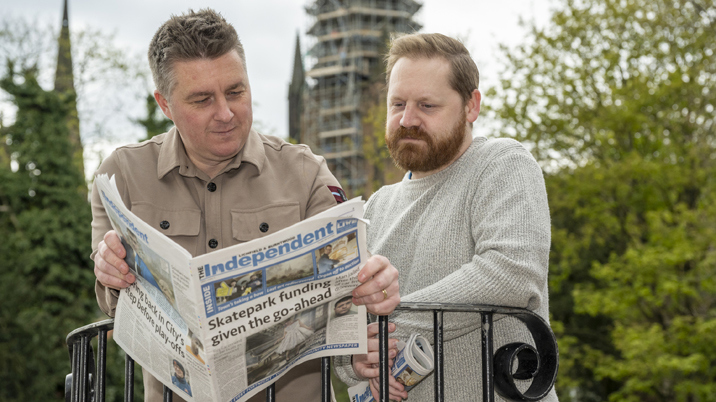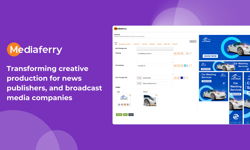
Ross Hawkes, the man behind the West Midlands’ newest newspaper, hands over a copy of the Lichfield and Burntwood Independent and proclaims: “We haven’t reinvented the wheel here.
“We have just gone back to the wheel being round. So many people tried to come up with whizz-bang ways to streamline, make things quicker, make things more efficient, whereas actually it is back to content being king.
“If we get the content right, then the readers are happy. If we get happy readers, the advertisers are happy – it is all a lovely circle.”
Ross and website developer colleague Philip John – a self-confessed ‘geek’ who provides much of the technical input into the Independent and its sister online operation Lichfield Live – stand at the vanguard of an intriguing local publishing venture that could yet make embattled news executives up and down the land rethink their long-standing assumptions over the future of a beleaguered industry.
While bosses at the big groups like Reach, National World and Newsquest preside over a seemingly irreversible decline in circulation which has left much loved print titles across the land on the verge of extinction, Ross and Phil are lapping up the plaudits from their newly acquired readers in the quintessentially Middle England location of Lichfield.
Of course, it’s very early days for the Independent and a shade invidious to compare the fortunes of a 7,500 copy fortnightly freesheet in a genteel cathedral city with the trials of national publishing groups struggling to turn that digital dream into elusive gold to replace the lost hundreds of millions of print advertising revenue which have migrated online.
Nevertheless, the fundamental journalistic principle espoused by Ross and Phil – that editorial content is king – surely deserves to resonate way beyond the boundaries of Lichfield as print at a local and regional level faces a critical stage in its battle for survival.
The Lichfield and Burntwood Independent was originally launched as a trial run of four issues by Ross – a West Midlands based career journalist who works full time as a journalism lecturer at Birmingham City University when he’s not writing about planning rows, charity events, theatre shows, lost dogs and the like – and his web developer expert Phil.
Digital beginnings
The pair had worked together for around 15 years on Lichfield Live, an online news site which has grown to become one of the West Midlands’ more enduring publishing ventures in the most volatile of eras for traditional media grappling with the excesses of the internet and the dubious offerings from self-appointed keyboard critics masquerading as trained journos.
Ross believes that Lichfield Live has survived and prospered because it has stuck to a journalism-based formula that for decades sustained the likes of much-loved regional titles from the Liverpool Echo to the Manchester Evening News, the Birmingham Mail to the Coventry Evening Telegraph and countless others elsewhere.
But while today’s print buyers in the likes of Liverpool, Manchester, Birmingham and Coventry can sadly be counted in just a few thousand compared to the glory years of the 60s and 70s, the journalistic principles that once underpinned those titles and others across the UK live on in Lichfield – both online and now in print.
Says Ross, who left his Birmingham based role helping launch websites for the then Trinity Mirror to go into academia as a lecturer: “One of the reasons I went down the Lichfield Live route is that I was missing newspapers.
“I have always loved newspapers and am quite nostalgic about it. I have told Phil plenty of times about how much I enjoyed those newspaper years. I still had that itch, that desire to want to ‘do journalism’ for want of a better term.”
With the disappearance of fondly recalled district offices up and down the land – including in Lichfield, where the Birmingham Evening Mail, the Wolverhampton Express and Star, the Lichfield Mercury and the Lichfield Post weeklies had once fought a battle royal for readers – Ross had found a free run for Lichfield Live.
“We had a bit of a free rein, there was nobody really reporting digitally. We were able to pick up some of the real ultra local community bits and pieces. I started it and then Phil came along – he could see that I was floundering in the digital space.
“Phil came along and stabilised things very much. It was just the two of us. We had some up and down years but traffic-wise it has always gone up. I would go to work, teach the students, come home and then do a full-time job as a journalist again.
Print rationale
“My office was the train or sat outside an appointment that my wife had gone to with my daughter, and that has continued to this day.
“The Lichfield Mercury closed – we had always spoken about print and that is when that conversation really started because we were getting people bemoaning the lack of a newspaper.
“We put this little fighting fund together so that we didn’t have to rely on advertising from the outset and said ‘yes, we will go for it.’
Under the umbrella of a formalised community interest company Lichfield Community Media – a ‘not for profit or for loss’ operation as Ross puts it – the duo set about reversing the trends of an industry which has seen dozens of print titles close – and threatens the future of many more.
The momentum for the launch of the Lichfield and Burntwood Independent increased after Philip attended a conference in Bristol last November organised by the Public Interest News Foundation, a national body which supports and advises independent news providers.
Says Philip: “We started talking about print and the big thing I came away with was that print was key to sustainability – the advertising money is still in print.
“We had had online advertising for years but had had very little interest really. Online, we are making a few hundred quid a month, our hosting bill is about £1,200 a year and we have got other costs like software so you are probably talking of £200 or £300 profit every month online. When it comes to the paper, we are already working on at least a grand profit every issue – that is without us proactively going out there.
“We were comfortable with potentially losing £6,000 over a trial run, the cost to do four editions with all the distribution, mileage etc. We have now got enough advertising booked in already so that every issue until at least September is profitable.”
With the trial run now consigned to history, the Lichfield and Burntwood Independent – a fortnightly 32-page tabloid packed with local news, photographs and three or four pages of sport – has increased its distribution run from 5,000 to 7,500, and is contemplating a permanent return for the much maligned vehicle of print in the cathedral city which was once birthplace to Samuel Johnson, man of letters and inventor of the modern dictionary.
Says Ross: “Door to door distribution was never really an option because of the costs and the logistics. We decided to go down a distribution network – we have got newsagents, pubs, town council offices. People go and pick them up with their own hand.
“We printed that first edition and published it, and we straightaway realised that people wanted it. We were getting calls from places saying ‘we have run out, we need more’.
“We made a decision to go up to 7,500. If places keep coming back and saying we need more then we will have to look at that.”
Next steps
Phil, who delivers the Independent throughout the Lichfield district every other Thursday in a three and a half hour labour of love, adds: “At the moment, the paper is profitable. We are working towards the idea that the paper helps us get to a point where we can employ staff which will help us to further develop more revenue streams.
“We already have online advertising but we are working on things like newsletter advertising. We have got four newsletters that we send out now. We are going to introduce newsletter sponsorship for local advertisers and we have got a really good social media following that we can monetise as well.
“The idea is that the newspaper will get the advertising revenue as well as providing a great paper to the community and that will give us the money to develop other revenue sources as well that will sustain us long into the future.”
Ross adds: “We are looking at, can we come up with funding bids to be able to apply to put young journalists through training schemes to then do some work for us. That will make it a bit more sustainable editorially and give me an hour off every now and again.”
Phil, who admits that he has caught the local news bug from working with Ross on Lichfield Live for so many years, is adamant that the Lichfield and Burntwood Independent can bring its own journalistic creed to a West Midland news landscape littered with waves of redundancies with the loss of many experienced journalists dedicated to their craft and subsequent plunging circulations.
“If we think the likes of Reach are eventually going to just collapse in on themselves because they are making terrible decisions, it’s people like us who are providing another alternative model for how we can do better news. The more student journalists who get involved in it, the better.”
With so many regional print titles now on life support after years of trying to turn digital into a cash cow whilst cutting staff year after year, Ross Hawkes and Philip John can at least point to a refreshingly different approach to news which goes against the majority of recent trends.
And whatever happens to the Lichfield and Burntwood Independent – or Lichfield Live – you suspect that noble journalistic principles will remain unchanged for Ross Hawkes and Philip John.
Or as Ross says: “We are a local paper for local people, a local publisher for local people… content is king.”
This article was first published in InPublishing magazine. If you would like to be added to the free mailing list to receive the magazine, please register here.










